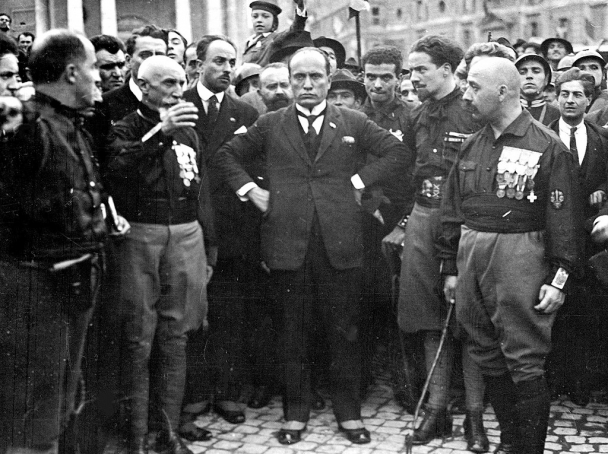Here’s what it looks like when democracy tumbles into an autocracy

Future Italian dictator Benito Mussolini, shown at the fascist congress in Naples, Italy – a "dress rehearsal" for the march on Rome which the fascists carried out a few days later. (Wikimedia Commons, Public Domain)
President Joe Biden has declared that the fall election could well determine the fate of a democracy in the United States. According to the president, the election of Donald Trump will result in the installation of an autocracy in the U.S.
The separation of powers will, for all practical purposes, be obliterated, Biden argues. Fair and free elections will be replaced by massive voter suppression; and one-man rule, the prime characteristic of an autocratic government, will become us, the good old U.S.A. Trump won’t become president as much as assume king-like power over the land of the free and home of the brave.
Trump aside, let’s just say at this point, “maybe, maybe not.” Rather, we should try to understand how an independent country allows, permits, or is forced to turn into a totalitarian government.
The examples of those forced to convert to a dictatorship come easily to mind. Fidel Castro militarily coming to power in Cuba, communism replacing a czar in Russia and any number of countries that simply maintain an existing government or lose freedom using force. (Noting that all those who obtain power in this manner immediately promise free and fair elections in the future, which just never come.)
But countries with an existing democracy followed a different path. They simply voted to give up elective government. A military insurrection will not happen in America. It is not realistic to expect an army of tanks to travel down 1600 Pennsylvania Ave., pull up to the White House, and demand a president leave. But, if we choose to forego democracy for totalitarianism, it will be by our own hand.
Here, history gives us a guide. I am reluctant to cite Germany and Adolph Hitler as an example, although it is one. But it is too pejorative to be regarded as fair since it implies that the former president is an adherent. A more acceptable example is Italy.
The Italians did not join the Allied forces at the outbreak of the First World War. Although late to join the fray against Germany and Austria, they expected to be rewarded. While generous were the terms of the Paris Accord, it did not make the Italians happy. As Margret MacMillian reported in her epic work, “Peacemakers: The Paris Peace Conference of 1919 and Its Attempt to End War,” Italy “did not do badly. . . but that was not the view in Italy.” The delegation returned home to the chaos of the 1920s.
Italian factories had badly overproduced war armaments, which were no longer needed. Workers, private and public, were frequently on strike. Railroads were subject to interruptions of service. Inflation was so bad that a landlord collecting rent would see the payment decline in value even before they could return and deposit the sum in the bank. There was widespread dissatisfaction with a government seen as unfunctional. Enter Benito Amilcare Andrea Mussolini.
Mussolini, who had served, and was wounded in the war, broke with the socialists and formed his own party. His rise in parliament was aided by armed squads of veterans, known as the Blackshirts, who engaged in intimidation, force, and even assassination of political rivals.
When King Victor Emmanuel III asked him to form a new government, Mussolini quickly obtained ever-increasing power, culminating in the 1924 Christmas Eve Resolution that granted him absolute authority as Il Duce or The Leader.
The bond between the rise of an autocrat and the willingness of the population to concede to it, in Germany, Italy or elsewhere, is based in deep dissatisfaction in the body politic within the conditions of their society. The additional factor is a legislative body willing to relinquish its authority. Since a parliament, congress, or chamber of deputies is most frequently made up of the supporters of the anointed leader, the step from freedom to totalitarian rule is a short one.
As we work our way out of an inflationary period, where wages have risen but have been outpaced by rising prices of necessities, challenging times on the international front, and deep belief among a third of our population that only solution is to convert to a Christian nation as they perceive it, many feel deeply that existing conditions are unacceptable.
We also must factor in that our Congress has within it many supporters of former President Trump. In fact, particularly in the House of Representatives, many members are almost lining up to kiss the ring Trump wears. When you put all these forces together, to anyone who says we will not give up our democracy, I would say, “We are in the process of doing it.”
This column was originally published by the Waterloo-Cedar Falls Courier, and is republished here from the Iowa Capital Dispatch under a Creative Commons license (CC BY-NC-ND 4.0). Read more at iowacapitaldispatch.com.
Category:
The Eagle Grove Eagle
The Eagle Grove Eagle
P.O. Box 6
304 West Broadway
Eagle Grove, IA 50533
Phone: 1-515-448-4745
FAX: 1-515-448-3182
Email: news@eaglegroveeagle.com
Mid-America Publishing
This newspaper is part of the Mid-America Publishing Family. Please visit www.midampublishing.com for more information.